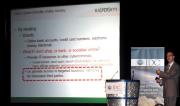|
|
|
|

|
UAE Most Affected Market With 56% Of Total GCC Attacks, Confirms Kaspersky Lab
Published Nov 9, 2010
|
Automated targeted online attacks are becoming commonplace and are the cause of growing security concerns for Middle East businesses according to a cybercrime expert.
Speaking at the IDC conference held in Dubai today, David Emm, Senior Regional Researcher, UK, Global Research & Analysis Team, Kaspersky Lab, a leading developer of secure content management solutions, a growing number of cybercriminals are now focused on targeted attacks on businesses of all sizes. He said that their aim is to infiltrate an organization to get their hands on future product development information, sensitive source code, executive emails, customer information, third party data hosted by the victim and credentials for production systems.
“Targeted attacks impose a dramatic threat on businesses and it only takes a vulnerability that has a window of one hour to execute an attack. The cybercriminals’ inside knowledge of business systems, and the use of zero-day vulnerabilities, like the recent Stuxnet worm attack that used multiple vulnerabilities to target SCADA systems, emphasize the risk to critical infrastructure including oil pipelines, power plants, large communication systems, airports, ships, and even military installations globally,” said David Emm.
Stuxnet worm’s ultimate aim was to access Simatic WinCC SCADA, used as industrial control system that monitors and controls industrial, infrastructure, or facility-based process. Kaspersky’s Lab security experts who analyzed the worm code insist that Stuxnet’s primary goal was not to spy on infected system, but to conduct sabotage.
“Stuxnet is the most sophisticated and impressive attack seen so far. The United Arab Emirates is the most affected GCC market with 56% of the total attacks, followed by Saudi Arabia, which registered 23.4% of the total GCC attacks. Bahrain, Kuwait and Oman shared an average of 6% each,” continued David Emm.
“Organizations must implement high security measures to survive targeted attacks, starting by the proper security mindset with staff education, security policies, reporting process, to minimizing the attack surface and using proactive protection technologies, in order to provide the necessary edge for remaining secure”, continued David Emm.
United Arab Emirates rated second source of spam in the GCC region after Saudi Arabia according to Kaspersky Lab’s Q3 report. According to Kaspersky Lab experts, the malware found in the Gulf region is in line with what Kaspersky Lab sees worldwide.
About Kaspersky Lab
Kaspersky Lab is the largest antivirus company in Europe. It delivers some of the world’s most immediate protection against IT security threats, including viruses, spyware, crimeware, hackers, phishing, and spam. The company is ranked among the world’s top four vendors of security solutions for endpoint users. Kaspersky Lab products provide superior detection rates and one of the industry’s fastest outbreak response times for home users, SMBs, large enterprises and the mobile computing environment. Kaspersky® technology is also used worldwide inside the products and services of the industry’s leading IT security solution providers.
Learn more at www.kaspersky.com. For the latest on antivirus, anti-spyware, anti-spam and other IT security issues and trends, visit www.securelist.com
For further information please contact:
Cynthia Darwish, Associate Account Manager, GolinHarris, Dubai: +971 50 216 3352
Sousie Babekian, Account Executive, GolinHarris, Dubai: +971 50 5950735
Posted by
VMD - [Virtual Marketing Department]
|
|
|

